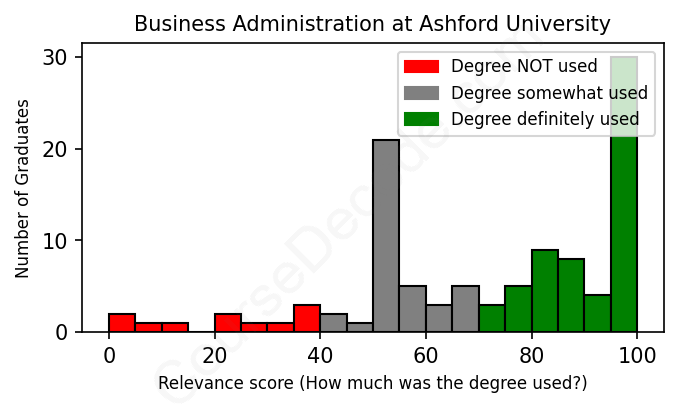
First, some facts. Of the Business Administration graduates from Ashford University we've analyzed , here's how many have used (or NOT used) their degree in their career:

These are estimates based on AI analysis of 107 LinkedIn profiles (see below).
The verdict? Slightly above average. Overall, with an average relevance score of 71%, Business Administration graduates from Ashford University have a slightly higher likelihood (+4%) of finding work in this field compared to the average graduate across all fields:
And for comparison, here's the chart for all profiles we've looked at across all degrees.
Also, after graduating, only 18% of these graduates have pursued further education other than another Bachelor's degree (such as a Masters degree or other), compared to the average across all profiles of 35%. This suggests a Bachelors degree is enough for most Business Administration graduates, and it's normal to look for work straight after graduation.
See the details:
|
Relevance score: 80% We think this person has gone into a career highly relevant to their degree. We think this person has gone into a career highly relevant to their degree.
DEGREE INFOGraduated in 2015 from Ashford University with a Bachelor of Business Administration - BBA in Business Administration. No other secondary education since. JOB HISTORY SINCE GRADUATIONDistrict Manager Channel Control Merchants, LLC Oct 2017 - Oct 2021 Regional Manager  Channel Control Merchants, LLC Oct 2017 - Oct 2022 Market Manager  FullSpeed Automotive Jul 2023 - Present ABOUTA dedicated professional with a proven track record of delivering results through demonstrating talent in leadership, planning, critical thinking, communication, and collaboration. A passionate and principled developer of people and teams. |
The top 10 most common jobs done by the graduates we've analyzed (ranked most common to least) are:
When we take a look at the careers of graduates from Ashford University's Business Administration program, it paints a pretty interesting picture. The most common types of jobs that alumni have ended up in include roles like managers, analysts, and various positions in the healthcare and service industries. A significant number also ventured into entrepreneurship, starting their own businesses in fields ranging from food service to wellness and consulting. You can see a pattern here where many graduates find themselves in managerial or operational roles, as these positions naturally demand the leadership and organizational skills that are taught in business programs. In fields like healthcare, real estate, and retail, these roles often leverage the principles of business management that students learned during their studies.
Now, when it comes to the relevance of these jobs to their degree, most graduates do seem to find positions that align closely with their education in Business Administration. Many of the jobs, like those of managers, analysts, and directors, directly relate to business principles such as operations management, finance, and strategic planning. For instance, positions like Financial Analysts, Operations Managers, and Division Managers not only require a solid understanding of business concepts but also benefit from the analytical, leadership, and communication skills baked into their degree coursework. However, there are also alumni who ended up in jobs that don’t align as closely with their education, such as sales roles or administrative positions that don’t require extensive business skills. So, while a lot of graduates indeed found relevant positions, there is a notable number who ventured into areas that don't heavily lean on the core teachings of Business Administration.
Here is a visual representation of the most common words in job titles for Business Administration graduates (this is across all Business Administration graduates we've analyzed, not just those who went to Ashford University):

Analyzing the career trajectories of graduates from Ashford University who earned a degree in Business Administration reveals a variety of paths, showcasing both solid successes and a range of experiences in different fields. Most graduates appear to have landed jobs within a few years of graduation, reflecting a mixture of immediate employment in relevant business roles and longer-term advancement in their careers.
For many of the graduates who completed their studies in the early 2010s, their first positions after graduation often included roles like pricing analysts, operations managers, or market directors. These initial positions suggest that alumni usually stepped right into business-related jobs that leveraged their degree. For instance, roles at companies like Wal-Mart and various managerial positions at healthcare and service industries indicate a solid start towards growth in their chosen fields. Fast forward about five years, and we can see that many are now holding advanced positions such as directors, managers, and even executives, largely within companies tied to operations, finance, or marketing. This trajectory demonstrates that graduates were able to build on their foundations and climb the career ladder effectively.
However, some graduates have had less conventional paths. A few seem to have veered off into areas that aren't traditionally considered business administration roles, such as teaching or working in healthcare without a direct business function. You can spot instances of graduates starting small businesses, like one who owns a barbecue sauce company or another who operates a travel advisory service. While entrepreneurship is definitely a valid path taken by some, it suggests that not everyone found a direct line from their degree to corporate roles. Others took roles in areas like logistics or healthcare that might not align perfectly with a Business Administration focus, yet they still found ways to utilize their skills in management and operations.
As we look towards more recent graduates from 2019-2023, it seems there's a mix of jumping straight into practical roles within established companies and the entrepreneurial spirit observed in earlier classes. Graduates are currently taking on roles like financial analysts or operations supervisors, signaling that the trend of landing immediately relevant jobs continues. Additionally, the emergence of roles like 'Technical Program Manager' indicates a shift towards tech-focused opportunities, suggesting that these graduates are adapting to the evolving job landscape.
In summary, Ashford University graduates with a degree in Business Administration mostly seem to navigate a successful path, moving into positions that enhance their professional skills and career potential. While there are a few who wander outside traditional roles, the overarching picture suggests that the degree provides a robust launchpad for various career aspirations—whether that’s climbing the corporate ladder, starting a business, or even shifting into entirely different fields.
Getting a Bachelor’s degree in Business Administration, whether at Ashford University or elsewhere, is generally manageable for most students, especially if you’re motivated and organized. The coursework usually covers a range of topics like finance, marketing, and management, giving you a broad understanding of how businesses operate. While it can get challenging at times, especially with group projects and deadlines, it’s not notoriously difficult compared to other degree programs. If you stay on top of your studies and actively participate, you’ll likely find it more on the easier side of the spectrum. Just remember, like anything, it’s all about how much effort you put into it!
Most commonly, in the LinkedIn profiles we've looked at, it takes people 2 years to finish a Bachelor degree in Business Administration.
Looking at the career paths of these graduates from Ashford University, it seems like a mixed bag when it comes to their financial success. Many of them have taken on significant roles like Operations Managers, Financial Analysts, and even Executive Vice Presidents, which typically come with a decent paycheck. Positions in management, especially in fields like healthcare and finance, usually suggest that they're earning above average. For instance, the graduates holding titles such as Division Manager or Market Health & Wellness Director are likely pulling in respectable salaries, signaling that they’ve found their financial footing post-graduation.
On the other hand, there are quite a few who have had more modest career paths. Some have started their own smaller businesses or worked in roles like Banking or Sales where the pay might fluctuate. While entrepreneurship can potentially lead to substantial income, it’s often a riskier route, and it takes time to build up revenue. Overall, while a lot of these grads are in positions that could lead to comfortable incomes, others might be still carving out their paths or facing financial challenges typical of entry-level and small business roles. So, it really depends on where they've landed in the job market and how they've leveraged their degree over the years.
Here is a visual representation of the most common words seen in the "about" section of LinkedIn profiles who have a Bachelor degree in Business Administration (this is across all Business Administration graduates we've analyzed, not just those who went to Ashford University). This may or may not be useful:

Here are all colleges offering a Bachelor degree in Business Administration (ordered by the average relevance score of their Business Administration graduates, best to worst) where we have analyzed at least 10 of their graduates: